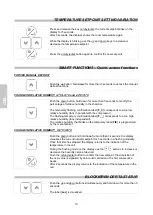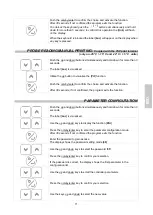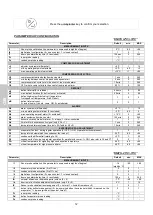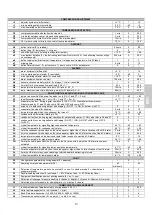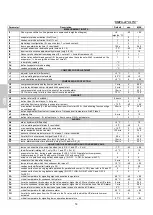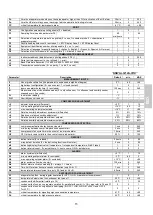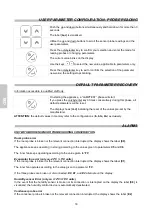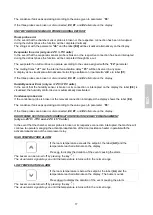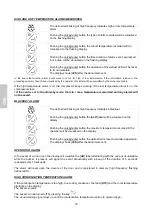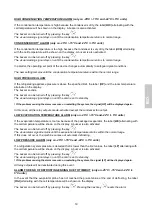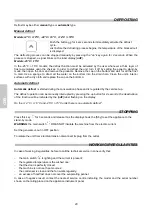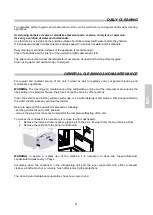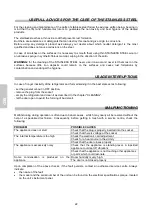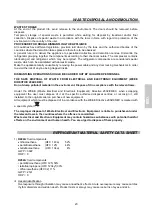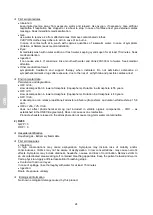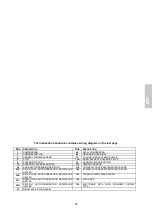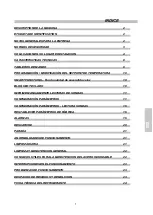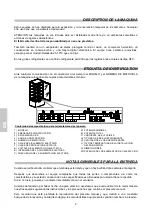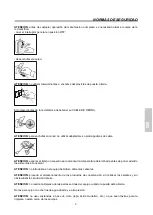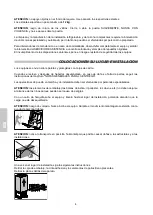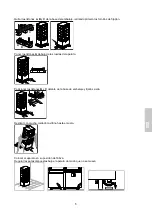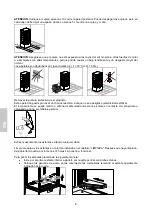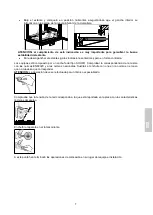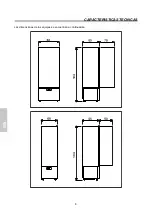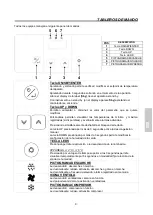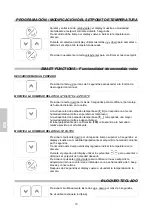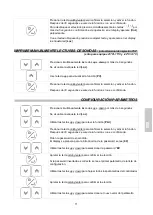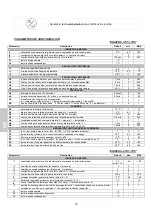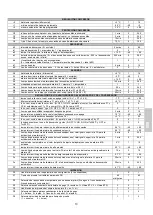
GB
24
❖
First aid procedures
•
Inhalation:
keep injured person away from exposure, warm and relaxed. Use oxygen, if necessary. Give artificial
respiration if respiration has stopped or is about to stop. In case of cardiac arrest give external cardiac
massage. Seek immediate medical attention.
•
Skin:
use water to remove ice from affected areas. Remove contaminated clothes.
CAUTION
: clothes may adhere to skin in case of ice burns.
In case of contact with skin, wash with copious quantities of lukewarm water. In case of symptoms
(irritation or blisters) seek medical attention.
•
Eyes:
immediately wash with ocular solution or fresh water, keeping eyelids open for at least 10 minutes. Seek
medical attention.
•
Ingestion:
it can cause vomit.. If conscious, rinse mouth with water and drink 200-300 ml of water. Seek medical
attention.
•
Other medical treatment:
symptomatic treatment and support therapy when indicated. Do not administer adrenaline or
sympatheticomimetic drugs after exposure, due to the risk of arrhythmia and possible cardiac arrest.
❖
Environmental data
Persistence and degradation
•
HFC 143a:
slow decomposition in lower atmosphere (troposphere). Duration in atmosphere is 55 years.
•
HFC 125:
slow decomposition in lower atmosphere (troposphere). Duration in atmosphere is 40 years.
•
HFC 134a:
si decompone con relativa rapidità nell’atmosfera inferiore (troposfera). La durata nell’atmosfera è 15,6
anni.
•
HFCs 143a, 125, 134a:
does not affect photochemical smog (not included in volatile organic components
– VOC – as
established in the UNECE agreement). Does not cause ozone rarefaction.
Product exhausts released in the atmosphere do not cause long-term water contamination.
2) R290
GWP = 3
ODP = 0
❖
Hazards identification
Liquefied gas - Extremely flammable
❖
First aid measures
•
Inhalation:
In high concentrations may cause asphyxiation. Symptoms may include loss of mobility and/or
consciousness. Victims may not be aware of asphyxiation. In low concentrations, may cause narcotic
effects. Symptoms may include dizziness, headache, nausea and loss of coordination. Remove victim to
an uncontaminated area wearing self contained breathing apparatus. Keep the patient relaxed and warm.
Call a physician. Apply artificial respiration if breathing stops..
•
Contact with skin and eyes:
In case of spillage, rinse thoroughly with water for at least 15 minutes
•
Ingestion:
Route of exposure unlikely
❖
Ecological information
No known ecological damage caused by this product
Summary of Contents for C8Q
Page 10: ...IT 8 CARATTERISTICHE TECNICHE Le dimensioni degli apparecchi sono riportati di seguito 184 184...
Page 28: ......
Page 54: ......
Page 62: ...DE 8 TECHNISCHE EIGENSCHAFTEN Die Ma e der Ger te sind die folgenden 184 184...
Page 80: ......
Page 88: ...GB 8 TECHNICAL SPECIFICATIONS The dimensions of the units are found below 184 184...
Page 106: ......
Page 132: ......
Page 140: ...NL 8 TECHNISCHE KENMERKEN De apparaten hebben de volgende afmetingen 184 184...
Page 159: ...RU 1 2 2 2 3 4 8 9 10 SMART FUNCTIONS 10 11 11 11 16 17 17 21 22 22 22 22 23 23 23 24 25...
Page 160: ...RU 2 Gelateria 25 15 C HFC Z Z Y 1 2 3 4 5 N 6 B C D E F G H L R W...
Page 161: ...RU 3 OFF...
Page 162: ...RU 4 12...
Page 163: ...RU 5 A B C A B C A A A B C B C C B...
Page 164: ...RU 6 10 5 min 10 cm min 5 cm min 5 cm 4 T 30 C 55 72...
Page 165: ...RU 7 SHUKO N60320...
Page 166: ...RU 8 184 184...
Page 178: ...RU 20 22 C 5 C 25 C 15 C HtC 22 C 5 C 25 C 15 C dCA HP stand by HP 22 C 5 C 25 C 15 C LtE...
Page 180: ...RU 22 3 Sby OFF OFF...
Page 181: ...RU 23 1 2 30 OFF...
Page 182: ...RU 24 2002 96 EC 2002 96 WEEE WEEE 2002 96...
Page 192: ...P 8 CARACTER STICAS T CNICAS As dimens es dos aparelhos s o relatadas a seguir 184 184...

